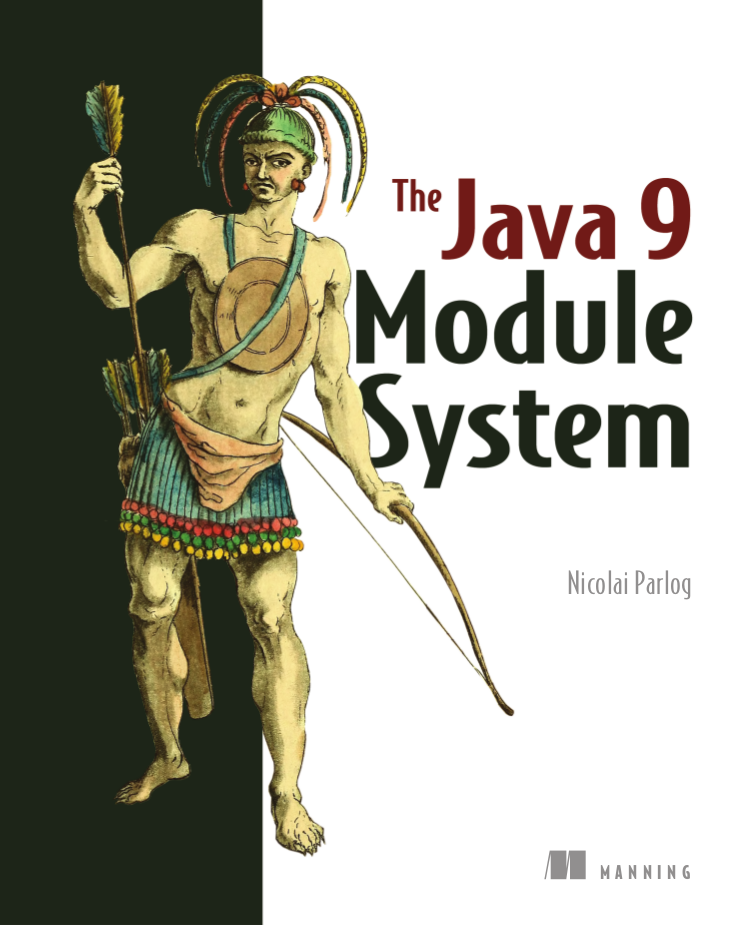module $module_name {
requires $other_module;
exports $api_package;
}The Java 9 Module System
Impedance Mismatch
Where the JVM disagrees with us
How do you think about Software?
What is it made of?
How I think about Software
interacting parts
parts have
names
dependencies
capabilities
creates a graph
How the JVM thinks about it
parts are packaged as JARs
to the JVM JARs
have no names
dependencies are unexpressed
have no coherent surface
JVM rolls them into one big ball of mud
Consequences
unexpressed, transitive dependencies
shadowing, version conflicts
complex class loading
slow
unsecure
maintenance nightmare
Project Jigsaw
Teaching the JVM about that graph
Quick History
- 2005
first discussions about modularity in JDK
- 2008
Project Jigsaw is created
- 2011-2014
exploratory phase; ends with JSR 376
- 2015
prototype is released
- 2017
Java 9 gets released with module system
Goals
Reliable Configuration
Strong Encapsulation
Scalable Systems (esp. the JDK)
Security, Performance, Maintainability
Non-Goals
Multiple Versions
Version Selection
Means
Introducing modules, which
have a name
express dependencies
encapsulate internals
Everything else follows from here!
Concepts & Features
Modules, Readability, Accessibility
Implied Readability, Qualified Exports
Modular JARs, Module Path, Module Graph
Services
Unnamed Modules, Automatic Modules
Reflection, Layers
Run-time Images
Java Module System Basics
Getting started...
Modules
Pieces of a puzzle
These are the nodes in our graph.
Definition
Modules
have a unique name
express their dependencies
export specific packages
(and hide the rest)
Implementation
Modules are JARs with a
module-info.class
(aka Modular JAR)gets generated from
module-info.java:this is called a Module Declaration or a
Module Descriptor
Readability
Putting the pieces together
Readability brings edges into our graph.
It is the basis for Reliable Configuration.
Definition
For two modules A and B with
module A {
requires B;
}we say
A requires B
A depends on B
A reads B
B is readable by A
Reliable Configuration
Java will only compile/launch when
every dependency is fulfilled
there are no cycles
there is no ambiguity
Consequences
boost for reliability
module system is strict and rigid
(no way to easily alter dependencies)accidental long cycles will cause problems
module name changes are not supported
Accessibility
Hiding internals
Accessibility governs which types a module can see.
It builds on top of Readability.
It is the basis for Strong Encapsulation.
Definition
A type in one module is only accessible
by code in another module if
the type is public
the package is exported
the second module reads the first
Strong Encapsulation
publicis no longer publiceven reflection doesn’t work
more fine-grained mechanisms exist:
for module authors in module declaration
for module users as command line arguments
Consequences
great boost for maintainability
major reason for community unrest
critical APIs survive until Java 10
(e.g.sun.misc.Unsafe— see JEP 260)life gets tougher for reflection-based
libraries and frameworks
Jigsaw Advent Calendar
A simple example
Find it on GitHub!
Structure

Code
public static void main(String[] args) {
List<SurpriseFactory> fac = asList(
new ChocolateFactory(), new QuoteFactory());
Calendar cal = Calendar.create(fac);
println(cal.asText());
}
No Module
modularization is not required
JARs continue to work as today!
(Unless you do forbidden things, more on that later.)
we can just put the application
on the class path as before
(Boring...)
No Module
Compilation, Packaging, Execution
# compile
javac -d classes/advent ${*.java}
# package with manifest
jar --create --file jars/advent.jar
--manifest ${manifest}
${*.class}
# run
java -jar jars/advent.jarA single module
Modularization

module advent {
// java.base is implicitly required
// requires no other modules
// exports no API
}(Still Boring...)
A single module
Compilation, Packaging, Execution
# compile with module-info.java:
javac -d classes/advent ${*.java}
# package with module-info.class
# and specify main class:
jar --create --file mods/advent.jar
--main-class advent.Main
${*.class}
# run by specifying a module path
# and a module to run (by name):
java --module-path mods --module adventA single module
Readability & Accessibility
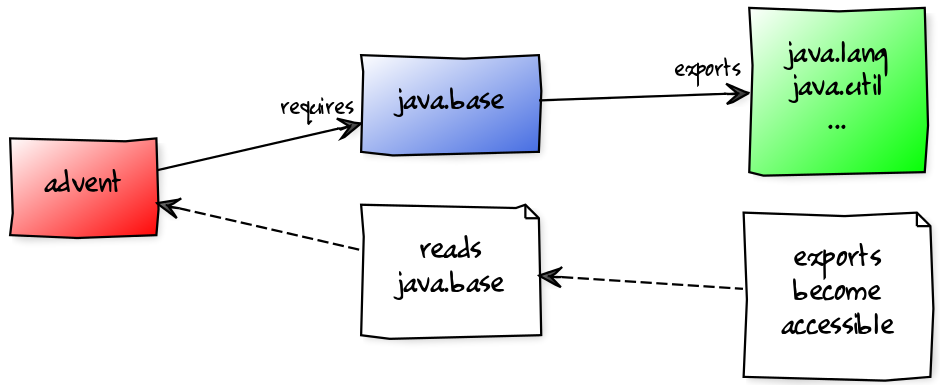
Multiple Modules


Multiple Modules

module surprise {
// requires no other modules
exports org.codefx.advent.surprise;
}module calendar {
requires surprise;
exports org.codefx.advent.calendar;
}module factories {
requires surprise;
exports org.codefx.advent.factories;
}module advent {
requires calendar;
requires factories;
requires surprise;
}Multiple Modules
Compilation, Packaging, Execution
# compile all modules at once
javac -d classes
--module-source-path "src"
--module advent
# package one by one, eventually advent:
jar --create --file mods/advent.jar
--main-class advent.Main
${*.class}
# launch the application:
java --module-path mods --module adventAdvanced Java Module System
Going Deeper...
Transitive Dependencies
Not all dependencies are created equal:
most are used within a module
some are used on the boundary
between modules
Transitive dependencies are about the latter.
Exposing dependencies
Example in calendar exposing surprise:
public static Calendar createWithSurprises(
List<SurpriseFactory> factories) {
// ...
}⇝ Module calendar us unusable without surprise!
Try and Error?
How can users of exposing module
determine required dependencies?
Try and Error?
No!
Implied Readability
Exposing module can mark dependencies
on exposed modules
with requires transitive:
module A {
requires transitive B;
}A reads B as usual
modules reading A will read B
without having to require it
⇝ A implies readability of B
Implied Readability
Applied to the advent calendar:
module calendar {
requires transitive surprise;
// ...
}
module factories {
requires transitive surprise;
// ...
}Further Applications
Implied readability is surprisingly versatile
aggregator modules
splitting modules up
even merging modules
renaming modules
Aggregator Modules
Making it easier to consume
calendar, factories, surprise:
module adventcalendar {
requires transitive calendar;
requires transitive factories;
requires transitive surprise;
}Splitting Modules
If factories gets split into
api, chocolate, and quotes:
module factories {
requires transitive factories.api;
requires transitive factories.chocolate;
requires transitive factories.quotes;
}Merging Modules
If calendar, factories, surprise
are merged into adventcalendar:
module calendar {
requires transitive adventcalendar;
}
module factories {
requires transitive adventcalendar;
}
module surprise {
requires transitive adventcalendar;
}Careful: Users suddenly depend on a large module!
Renaming Modules
If factories becomes surprisefactories:
module factories {
requires transitive surprisefactories;
}Summary
With A requires transitive B:
A reads B
any module reading A reads B
Applications:
make sure API is usable
without further dependenciesaggregator modules
splitting, merging, renaming modules
Optional Dependencies
Not all dependencies are equally required:
some are needed for a module to function
some can be absent and code adapts
are only needed to enhance
another module’s features
Optional dependencies are about the latter two.
Use Cases
Adapting code:
a library may be absent from some deployments
code is aware and does not call absent modules
Enhancing a module:
a project may provide usability functions
for other librariessuch code can not be called if module absent
Conundrum
With what we know so far:
for code to compile against another module
that module has to be requireda required module has to be present
at launch time
⇝ If a module’s types are used
it has to be present at run time
(Reliable configuration!)
Optional Dependencies
Dependency can be marked requires static:
module A {
requires static B;
}at compile time: A requires B as usual
at run time:
if B is present, A reads B
otherwise, app can launch
but access to B can fail
Adapting Code
Assuming each factory has its own module,
advent may not need both all the time:
module advent {
requires calendar;
requires factories;
requires static factories.chocolate;
requires static factories.quote;
}Adapting Code
Checking whether module is present:
Optional<SurpriseFactory> createChocolateFactory() {
if (isModulePresent("factories.chocolate"))
return Optional.of(new ChocolateFactory());
else
return Optional.empty();
}Enhancing A Module
Hypothetical library uber-lib provides
usability functions for various libraries.
module uber.lib {
requires static com.google.guava;
requires static org.apache.commons.lang;
requires static org.apache.commons.io;
requires static io.vavr;
requires static com.aol.cyclops;
}Assumptions:
nobody calls into Guava part without using Guava
no runtime checks necessary
Summary
With A requires static B:
at compile time: A requires B as usual
at runtime: B may be absent
Use to prevent absence of optional dependencies
from preventing application launch:
modules with code adapting to absense
utility libraries that aren’t called
without that dependency
Services
Consumers and implementations
of an API should be decoupled.
Service locator pattern:
service registry as central arbiter
implementors inform registry
consumers call registry to get implementations
In Java:
ServiceLoaderis the registrymodules can interact with it
Services
Module Declarations:
// consumer
module A {
uses service.Interface;
}
// provider
module B {
provides service.Interface
with some.Type;
}Services
A never "sees" providers like B
module system picks up all providers
A can get providers from
ServiceLoader
ServiceLoader.load(service.Interface.class)Factory Services
module advent {
requires calendar;
uses surprise.SurpriseFactory;
}
module factory.chocolate {
requires surprise;
provides surprise.SurpriseFactory
with factory.quote.ChocolateFactory;
}
module factory.quote {
requires surprise;
provides surprise.SurpriseFactory
with factory.quote.QuoteFactory;
}Factory Services
public static void main(String[] args) {
List<SurpriseFactory> fac = new ArrayList<>();
ServiceLoader.load(SurpriseFactory.class)
.forEach(fac::add);
Calendar cal = Calendar.createWithSurprises(fac);
System.out.println(cal.asText());
}Summary
To decouple API consumers and providers:
consumer
uses Serviceprovider
provides Service with Impl
Module system is service locator;
request implementations from ServiceLoader:
ServiceLoader.load(Service.class)`
Qualified Exports
So far, exported packages are visible
to every reading module.
What if a set of modules wants to share code?
Known Problem
Similar to utility classes:
if class should be visible outside of package,
it has to be public ⇝ visible to everybodyif package should be visible outside of module,
it has to be exported ⇝ visible to everybody
Module system fixes the former.
What about the latter?
Qualified Exports
module A {
exports some.pack to B;
}B can access
some.pack
as if regularly exportedother modules can not access it
as if not exported at all
Factory Utilities
To ease implementation of SurpriseFactory:
create new module factory
add class
AbstractSurpriseFactoryexport that package only to
factory implementation modules
module factory {
requires transitive surprise;
exports factory
to factory.chocolate, factory.quote;
}Summary
With A exports pack to B:
only B can access types in
packother modules behave as if
pack
not exported
Use to share sensible code between modules.
Reflective Access
Exporting a package makes it public API:
modules can compile code against it
clients expect it to be stable
What if a type is only meant
to be accessed via reflection?
(Think Spring, Hibernate, etc.)
Open Packages
module A {
opens some.pack;
}at compile time:
types insome.packare not accessibleat run time:
all types and members insome.pack
are accessible
A qualified variant (opens to) exists.
Open Modules
open module A {
// no more `opens` clauses
}The same as open packages
but for all of them!
Summary
With open modules or open packages:
code can be made accessible
at compile time onlyparticularly valuable to open
for reflection
Use to make types available for reflection
without making them public API.
Command Line Arguments
The module system is pretty strict but…
… not all modules are well-designed
… not all use cases were intended
What to do then?
Command Line Arguments to the rescue!
(I often call them "escape hatches".)
Command Line Arguments
All command line flags can be applied
to javac and java!
(Which is weird for --add-opens.)
When used during compilation,
they do not change the resulting
module descriptor!
Add Modules
If a module is not required,
it might not make it into the module graph.
Help it get there with --add-modules:
java --module-path mods
# --add-modules <module>(,<module>)*
--add-modules factories
--module adventAdd JavaEE Modules
JavaEE modules are not resolved by default!
java.activation
java.annotations.common
java.corba
java.transaction
java.xml.bind
java.xml.ws
They need to be added with --add-modules!
Add Readability Edges
Maybe a module in the graph is not readable
by another but you need it to be.
Add readability edges with --add-reads:
java --module-path mods
# --add-reads <module>=<target>(,<more>)*
--add-reads advent=factories
--module adventAdd Exports
A common case:
A module needs types that
the owning module doesn’t export.
Export them with --add-exports:
java --module-path mods
# --add-exports <module>/<package>=<target>
--add-reads factories/factories.quotes=advent
--module adventUse target ALL-UNNAMED to export to all modules.
Open Packages
Another common case:
A module reflects on types from a package that
the owning module doesn’t open.
Open packages with add-opens:
java --module-path mods
# --add-opens <module>/<package>=<target>
--add-opens factories/factories.quotes=advent
--module adventUse target ALL-UNNAMED to open to all modules.
(It is not possible to open an entire module.)
Summary
Edit module graph with:
--add-modulesto add modules--add-readsto add readability edges--add-exportsto export packages to modules--add-opensto open packages to modules
The latter two accept ALL-UNNAMED as target.
Migration
Moving Into Module Land
Why Is It Even An Option?
most module systems are "in or out",
but modularized JDK and legacy JARs
have to cooperate!so migration has to be possible
Enablers
Migration is enabled by two features:
Unnamed Module(s)
Automatic Modules
And the fact that module and class path coexist:
modular JARs can be put on either
"regular" JARs can be put on either
The Unnamed Module
Why The Class Path "Just Works"
Definition
The Unnamed Module
contains all JARs on the class path
(including modular JARs).
has no name (surprise!)
can read all modules
exports all packages
Inside the unnamed module
"the chaos of the class path" lives on.
Example
Put all your JARs on the class path.
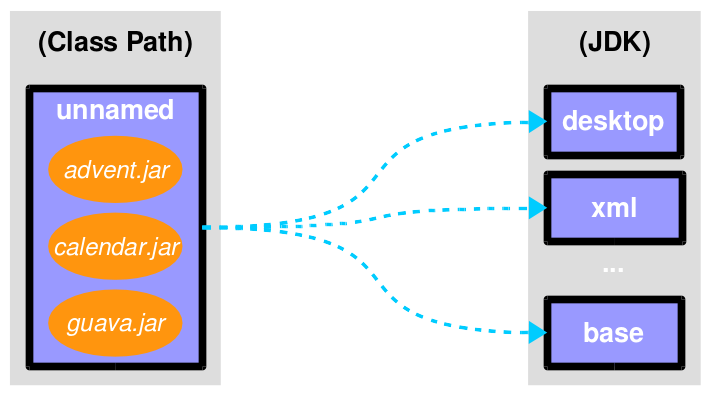
No Access
what if your code was modularized?
and your dependencies were not?proper modules can not depend on
"the chaos on the class path"this is not possible:
module advent { requires unnamed; }
No Access
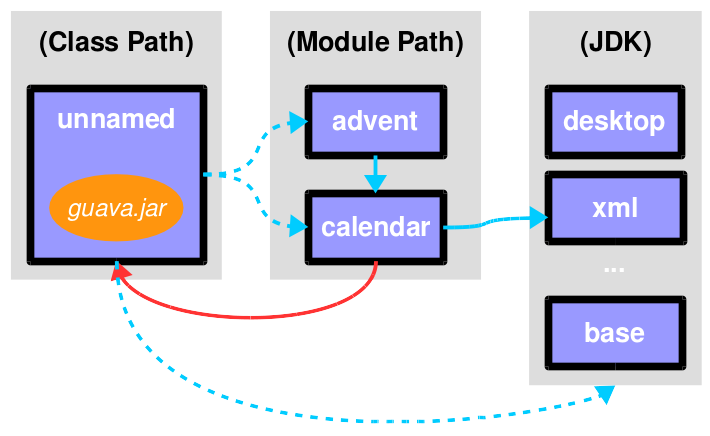
Automatic Modules
From Modules To The Class Path
Definition
An Automatic Module
is created for each "regular" JAR
on the module path.
gets a name based on the file name
can read all modules
(including the Unnamed Module)exports all packages
Example
put
guava-19.0.jaron the module paththen this works:
module advent { requires guava; }
Example
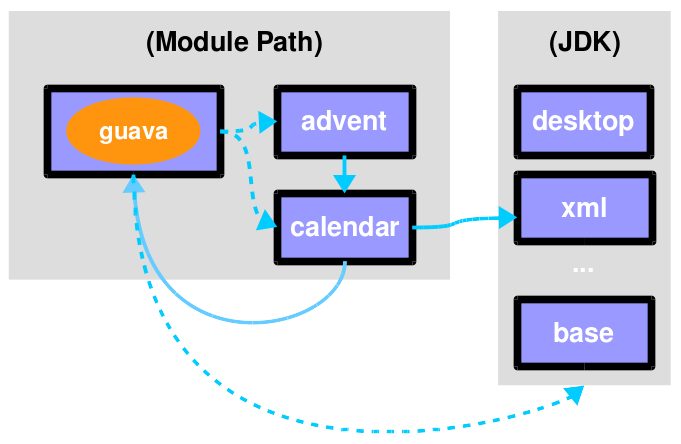
What Goes Where?
| Class Path | Module Path | |
|---|---|---|
Regular JAR | Unnamed Module | Automatic Module |
Modular JAR | Unnamed Module | Named Module |
Migration Strategies
Three strategies emerge:
bottom-up migration
top-down migration
inside-out migration
Bottom-Up Migration
Works best for projects without
unmodularized dependencies
(libraries).
turn project JARs into modules
they still work on the class path
clients can move them to the module path
whenever they want
Top-Down Migration
Required for projects with
unmodularized dependencies
(applications).
turn project JARs into modules
Top-Down Migration
modularized dependencies:
require direct ones
put all on the module path
unmodularized dependencies:
require direct ones with automatic name
put direct ones on the module path
put others on the class path
Top-Down Migration
When dependencies get modularized:
hopefully the name didn’t change
if they are already on the module path,
nothing changesotherwise move them there
check their dependencies
Inside-Out Migration?
What about published projects with
unmodularized dependencies
(libraries)?
top-down seems to work
but there’s a problem
with automatic module names!
Inside-Out Migration?
Unstable Module Names
automatic module names
are based on JAR namesfile names can differ
across build environmentsmodule name can change
when project gets modularized
⇝ Automatic module names are unstable.
Inside-Out Migration?
Impossible Module Requirements
dependencies might require the same
module by different namesthe module system does not support that
there is no way to launch that application!
⇝ JDK team recommends not to publish
modules that depend on automatic modules!
No Inside-Out Migration
Frameworks/libraries can only publish modules
once all dependencies were modularized.
This will make modularization of the ecosystem
take much, much longer! 😭
Compatibility
What to look out for
when running on JDK 9
Break Stuff
Some internal changes can break existing code!
Just by running on JDK 9
(even without modularizing the application).
JEP 261 contains a list of risks.
Internal APIs
internal APIs are:
all in
sun.*most in
com.sun.*
(unless marked@jdk.Exported)
most if them are encapsulated
critical APIs will survive until Java 10
(e.g.sun.misc.Unsafe— see JEP 260)six deprecated methods adding/removing
PropertyChangeListenergot removed
fromLogManagerandPack200
What to look for?
What to do?
contact library developers
look for alternatives
(in the JDK or other libraries)consider command line flags
--add-exports,--add-opens, or
--permit-illegal-access
Split Packages
packages should have a unique origin
no module must read the same package
from two modules
The implementation is even stricter:
no two modules must contain
the same package (exported or not)split packages on class path
are inaccessible
Examples
some libraries split
java.xml.*, e.g. xml-apissome JBoss modules split, e.g.,
java.transaction,java.xml.wsjsr305 splits
javax.annotation
What to look for?
search your code and dependencies
forjava(x)packages (jdepscan help)no tool support (yet?)
What to do?
is the split on purpose / necessary?
find other ways to solve the problem
upgradeable modules
to replace run-time modulescommand line
--patch-module
to add individual classes
Run-Time Images
new JDK/JRE layout
internal JARs are gone (e.g.
rt.jar,tools.jar)JARs are now JMODs
application class loader is no
URLClassLoadernew URL schema for run-time image content
What to look for?
does the code rummage around
in the JDK / JRE folder?search for casts to
URLClassLoaderare URLs to JDK classes / resources handcrafted?
Obsolete
Endorsed Standards Override Mechanism
Extension Mechanism
Boot Class Path Override
But wait, there’s more!
General Advice I
The most relevant for most applications:
internal APIs
split packages
General Advice II
get your code in shape
(and prevent relapses)check your dependencies and tools
if any are suspicious
(automatically true for IDEs, build tools):make sure they’re alive
get them up to date!
or look for alternatives
get an EA-build and try it!
About Nicolai Parlog
Want More?
⇜ Get my book!
I write a mean newsletter,
currently mostly about Java 9.
You can hire me.
What About OSGi?
Brief comparison
of Jigsaw and OSGi
Jigsaw vs. OSGi
OSGi Bundles:
are JARs with a descriptor (
MANIFEST.MF)have a name
import packages or bundles
define public API by exporting packages
Jigsaw vs. OSGi
| Jigsaw | OSGi | |
|---|---|---|
Versioning | not at all | packages and modules |
Run-time Behavior | mostly static | dynamic |
Services | declarative via | declarative or programmatically; |
Class Loaders | operates below | one per bundle |
Image Credits
Introduction
puzzle-people: Kevin Dooley (CC-BY 2.0)
binary-code: Christiaan Colen (CC-BY-SA 2.0)
ball-of-mud-2: Andi Gentsch (CC-BY-SA 2.0)
jar-hell: Wellcome Library, London (CC-BY 4.0)
Project Jigsaw
flag-amsterdam: George Rex (CC-BY-SA 2.0)
puzzle-cubed: David Singleton (CC-BY 2.0)
Java Module System
puzzle-piece-green:
StockMonkeys.com (CC-BY 2.0)puzzle-pieces-put-together:
Ken Teegardin (CC-BY-SA 2.0)iceberg:
NOAA’s National Ocean Service (CC-BY 2.0)class and module diagrams:
Nicolai Parlog (CC-BY-NC 4.0)
Migration
keep-out: Brian Smithson (CC-BY 2.0)
garbage-only: Peter Kaminski (CC-BY 2.0)
golden-gate: Nicolas Raymond (CC-BY 2.0)
confusion: Procsilas Moscas (CC-BY 2.0)
module diagrams:
Nicolai Parlog (CC-BY-NC 4.0)
Compatibility
broken-glass:
Eric Schmuttenmaer (CC-BY-SA 2.0)internals: David French (CC-BY 2.0)
cut: Jinx! (CC-BY-SA 2.0)
cells: Jonathan Lin (CC-BY-SA 2.0)
obsolete: Trevor King (CC-BY 2.0)
sign: Duncan Harris (CC-BY-SA 2.0)
Rest
question-mark: Milos Milosevic (CC-BY 2.0)
bundles: Danumurthi Mahendra (CC-BY 2.0)


